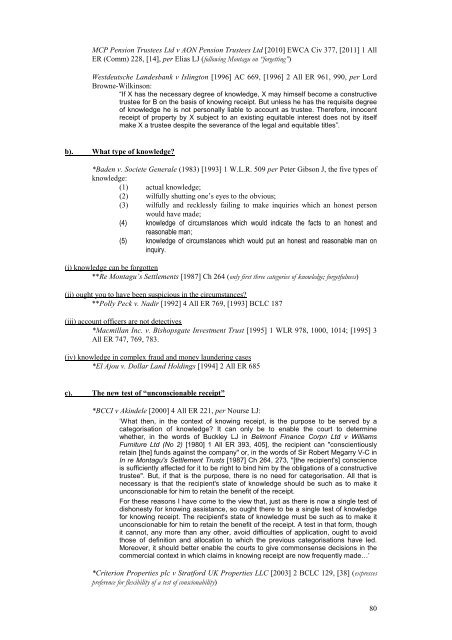Soton Equity and Trusts - alastairhudson.com
Soton Equity and Trusts - alastairhudson.com
Soton Equity and Trusts - alastairhudson.com
You also want an ePaper? Increase the reach of your titles
YUMPU automatically turns print PDFs into web optimized ePapers that Google loves.
MCP Pension Trustees Ltd v AON Pension Trustees Ltd [2010] EWCA Civ 377, [2011] 1 All<br />
ER (Comm) 228, [14], per Elias LJ (following Montagu on “forgetting”)<br />
Westdeutsche L<strong>and</strong>esbank v Islington [1996] AC 669, [1996] 2 All ER 961, 990, per Lord<br />
Browne-Wilkinson:<br />
“If X has the necessary degree of knowledge, X may himself be<strong>com</strong>e a constructive<br />
trustee for B on the basis of knowing receipt. But unless he has the requisite degree<br />
of knowledge he is not personally liable to account as trustee. Therefore, innocent<br />
receipt of property by X subject to an existing equitable interest does not by itself<br />
make X a trustee despite the severance of the legal <strong>and</strong> equitable titles”.<br />
b).<br />
What type of knowledge?<br />
*Baden v. Societe Generale (1983) [1993] 1 W.L.R. 509 per Peter Gibson J, the five types of<br />
knowledge:<br />
(1) actual knowledge;<br />
(2) wilfully shutting one’s eyes to the obvious;<br />
(3) wilfully <strong>and</strong> recklessly failing to make inquiries which an honest person<br />
would have made;<br />
(4) knowledge of circumstances which would indicate the facts to an honest <strong>and</strong><br />
reasonable man;<br />
(5) knowledge of circumstances which would put an honest <strong>and</strong> reasonable man on<br />
inquiry.<br />
(i) knowledge can be forgotten<br />
**Re Montagu’s Settlements [1987] Ch 264 (only first three categories of knowledge; forgetfulness)<br />
(ii) ought you to have been suspicious in the circumstances?<br />
**Polly Peck v. Nadir [1992] 4 All ER 769, [1993] BCLC 187<br />
(iii) account officers are not detectives<br />
*Macmillan Inc. v. Bishopsgate Investment Trust [1995] 1 WLR 978, 1000, 1014; [1995] 3<br />
All ER 747, 769, 783.<br />
(iv) knowledge in <strong>com</strong>plex fraud <strong>and</strong> money laundering cases<br />
*El Ajou v. Dollar L<strong>and</strong> Holdings [1994] 2 All ER 685<br />
c).<br />
The new test of “unconscionable receipt”<br />
*BCCI v Akindele [2000] 4 All ER 221, per Nourse LJ:<br />
‘What then, in the context of knowing receipt, is the purpose to be served by a<br />
categorisation of knowledge? It can only be to enable the court to determine<br />
whether, in the words of Buckley LJ in Belmont Finance Corpn Ltd v Williams<br />
Furniture Ltd (No 2) [1980] 1 All ER 393, 405], the recipient can "conscientiously<br />
retain [the] funds against the <strong>com</strong>pany" or, in the words of Sir Robert Megarry V-C in<br />
In re Montagu's Settlement <strong>Trusts</strong> [1987] Ch 264, 273, "[the recipient's] conscience<br />
is sufficiently affected for it to be right to bind him by the obligations of a constructive<br />
trustee". But, if that is the purpose, there is no need for categorisation. All that is<br />
necessary is that the recipient's state of knowledge should be such as to make it<br />
unconscionable for him to retain the benefit of the receipt.<br />
For these reasons I have <strong>com</strong>e to the view that, just as there is now a single test of<br />
dishonesty for knowing assistance, so ought there to be a single test of knowledge<br />
for knowing receipt. The recipient's state of knowledge must be such as to make it<br />
unconscionable for him to retain the benefit of the receipt. A test in that form, though<br />
it cannot, any more than any other, avoid difficulties of application, ought to avoid<br />
those of definition <strong>and</strong> allocation to which the previous categorisations have led.<br />
Moreover, it should better enable the courts to give <strong>com</strong>monsense decisions in the<br />
<strong>com</strong>mercial context in which claims in knowing receipt are now frequently made…’<br />
*Criterion Properties plc v Stratford UK Properties LLC [2003] 2 BCLC 129, [38] (expresses<br />
preference for flexibility of a test of conscionability)<br />
80













